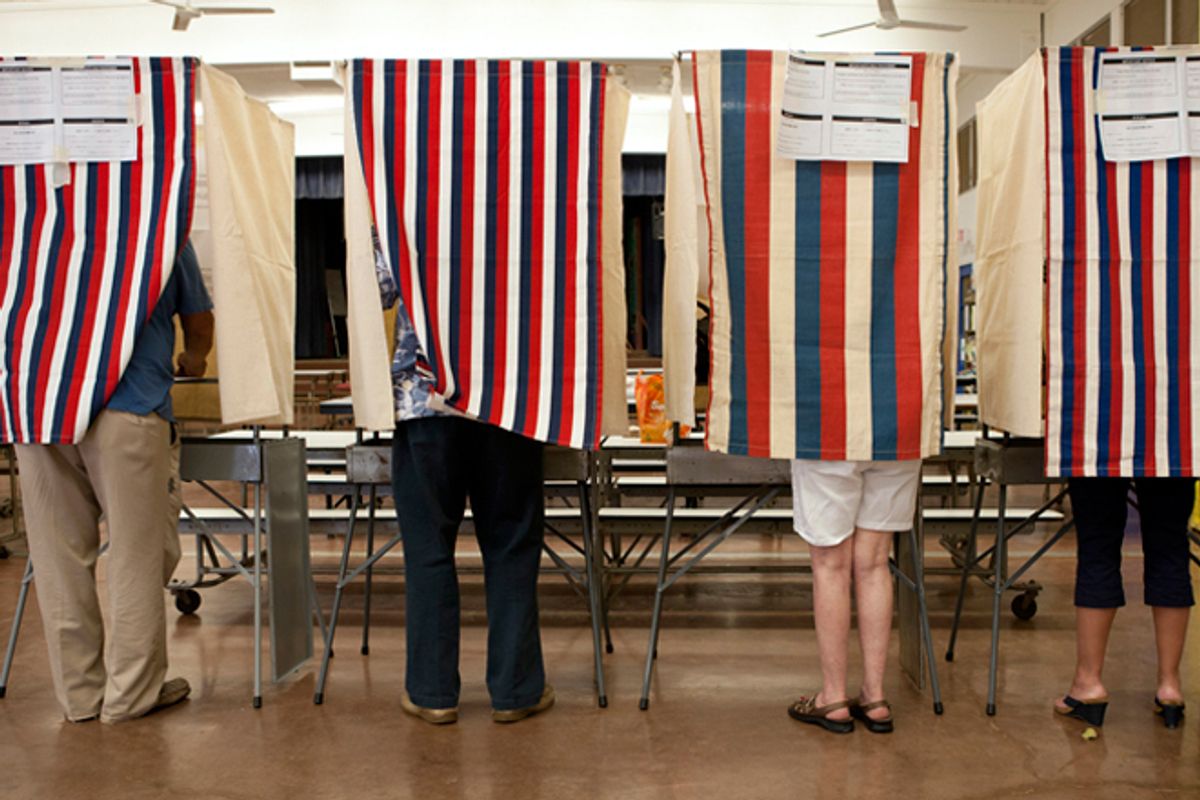haha next you’ll be telling me that you need a business license to work! Go ahead, say it! You’re hilarious!
Your own cite contradicts you, but you refuse to admit you were wrong. Why am I not surprised?
haha next you’ll be telling me that you need a business license to work! Go ahead, say it! You’re hilarious!
Your own cite contradicts you, but you refuse to admit you were wrong. Why am I not surprised?
I won’t argue with your cites about voters registering in two states. Maybe 1-2% of voters. Probably most prevalent in Northern state voters who winter in the South.
But, as far as people who fraudulently go up and ask for a ballot that isn’t theirs, this has to be a miniscule problem. If 0.1 % I’d be surprised.
Maybe. But then you have the problem of dead people voting, which voter ID actually would prevent:
And strangely, pretty much all of them are Republicans trying to prove that voter fraud happens…
Incorrect. I am self employed in New Hampshire, which does not require a business license for my type of business.
Most of those are the numbers of possible dead people that could be used in an election, when looking carefully if actual fraud was committed that way, the numbers are usually in the single digits.
Or, a single digit.
Maybe. But then you have the problem of dead people voting, which voter ID actually would prevent:
I see a lot of instances of dead people remaining on the voter rolls (inevitably, no bureaucratic system is perfect), but very few allegations of votes being cast in their names. I also see dead people bolded in several places, which makes me wonder who’s been editing this article.
Voting by Dead People
Or, if you prefer, living voters are casting ballots in the names of dead ones. (As in: ‘Among Voters in New Jersey, GOP Sees Dead People’ ‘1.8 Million Dead People Registered to Vote,’ and ‘Dead People Cast Over 950 Ballots in South Carolina.’)
The truth: In most cases, allegations arise from flawed matches of death records and voter rolls. Sometimes a voter turns out to have died after voting; in other cases, a living voter might be mistaken for a dead one with the same name.
Typical case: In Georgia in 2000, 5,412 votes were alleged to have been cast by dead voters over the previous 20 years. The allegations were based on a flawed match of voter rolls to death lists. An investigation turned up only one instance, and even this was later found to have been an error: One Alan J. Mandel was alleged to have voted in 1998, despite having died in 1997. It turned out that another Alan J. Mandell (two "l"s) – very much alive – was the guy who’d voted, but election workers simply checked the wrong name off of their list.
Well, it’s good to know that absence of evidence is evidence of absence. THat means we don’t have to worry about electronic voting machines, since there’s no evidence that anyone has ever tried to steal an election with them.
As far as dead people voting goes, we know for a fact that this tactic was used to steal elections in the past, most notably the Daley machine in Chicago. Have protections been put in place to prevent this kind of thing happening since, or did we just decide to trust people?
So you’re saying that the fact that there is no evidence for voter fraud, is meaningless? Must be nice to not need evidence to base your opinions on.
The difference is that there is no mechanic for widespread in person voter fraud that can happen with a few bad apples. You’d need thousands of people to work an in person scheme.
If you cared to think about it, you’d realize that the reason voting machines are a concern, is that one person can leverage thousands of votes that way.
Prove that someone has ever tried to do it. I can prove voter fraud, people get convicted for it all the time, often party officials, especially with the absentee ballots.
Well, it’s good to know that absence of evidence is evidence of absence.
No, this is evidence that you are not reading the evidence, but we knew that already. ![]()
That means we don’t have to worry about electronic voting machines, since there’s no evidence that anyone has ever tried to steal an election with them.
Who says we do not have to?

It would explain his Fox News outburst, but the Hacker claim lacks evidence
In any case, as the article reports, there is no strong evidence for tampering machines in the recent elections, and even before the election more serious left leaning media had an issue with the alarmism coming from some leftist groups.
http://thinkprogress.org/election/2012/10/22/1059171/why-romney-isnt-rigging-the-voting-machines/
The thing is that this item you helpfully mention actually points to yet another Republican obstruction dick move. The EAC was a group created after the 2000 mess and one of its tasks are to keep an eye and to assist to states that have trouble making improvements to their electoral systems. Republicans are not interesting on having anyone looking at evidence of improper behavior, and that includes artificially added time by cutting hours and making complicated ballots to reduce the number of voters. Point being that the most logical reason for this obstruction is that the obstructionists know who will be caught the most with their hands in the cookie jar.
http://thehill.com/blogs/congress-blog/campaign/302857-revive-the-election-assistance-commission

An organization designed to make elections function better has been hamstrung by GOP obstruction
Prove that someone has ever tried to do it.
It doesn’t matter if no one has tried large scale voter fraud via electronic machines. The fact that it’s possible means we should be concerned. Especially since Republicans are habitual in their desire to manipulate elections via dishonest means. If no one has ever broken into my house, I still lock the doors.
I can prove voter fraud, people get convicted for it all the time, often party officials, especially with the absentee ballots.
I said in person voter fraud. Do us a favor and do the basic reading so that you know something about the subject and get back to us.
There simply aren’t thousands of people willing to commit felonies by in person voting and remain utterly silent about it just to add a few votes. So voter ID is a stupid solution to that problems. Especially when more people would be kept from voting than would have illegitimately voted.
Well, it’s good to know that absence of evidence is evidence of absence. THat means we don’t have to worry about electronic voting machines, since there’s no evidence that anyone has ever tried to steal an election with them.
AFAIK, no court convictions have been won, but the machines are certainly very easy to be hacked whether fraud is occurring or not. And there is much circumstantial evidence of fraud.
Voting machines have defects which could be exploited. Secrecy makes it impossible for independent experts or even governments to verify the integrity of voting machines.
[QUOTE=http://www.commondreams.org/headlines03/0828-08.htm]
The head of a company vying to sell voting machines in Ohio told Republicans in a recent fund-raising letter that he is “committed to helping Ohio deliver its electoral votes to the president next year.”
[/QUOTE]
On December 22, 2011, the U.S. Election Assistance Commission (EAC) … ruled that the ballot scanners made by ES&S electronic voting machine firm failed 10% of the time to read the votes correctly. Ohio is one of 13 states that requires EAC certification before voting machines can be used in elections. The Cleveland Plain Dealer reported in 2010 that the voting machines in heavily Democratic Cuyahoga County had failed during testing for the 2010 gubernatorial election. Cleveland uses the same Republican-connected ES&S ballot scanners—the DS200 opti-scan system. Ohio’s Mahoning County, home of the Democratic enclave of Youngstown, also uses the DS200s. The same opti-scan system is also used in the key battleground states of Florida, Illinois, Indiana, New York, and Wisconsin.
Voting rights activists fear a repeat of the well-documented vote switching that occurred in Mahoning County in the 2004 presidential election when county election officials admitted that 31 of their machines switched Kerry votes to Bush.
New York City Board of Elections refuses to take action on haywire voting machine.
Et cetera, et cetera.
… So voter ID is a stupid solution to that problem…
Yes, but voter ID is a smart solution to a different “problem.”
UN election observers amazed at lack of ID requirements.
Yeah, well, the UN wants to take your guns, so maybe that’s not such a good cite.
Is the US unique in that ID requirements cause mass disenfranchisement, or is this a problem in Canada and Europe as well?
Chalk it up as another consequence of American Exceptionalism.
Fortunately, most of our states are sane on the issue and do require ID. Dead people can still vote in Illinois, of course, if they choose to.
Most Americans are happy with the idea of voter ID responsibly implemented … but not if it is instituted as part of a deliberately policy to block or discourage citizens from voting.
UN election observers amazed at lack of ID requirements.
Oh my. This has been beaten to death in prior threads. Please read those to fight your ignorance. You will learn that voter ID is supported by Democrats in principle. You will also learn that the Republican Party has adopted, or tried to adopt, voter ID laws intended to disenfranchise, in effect, legitimate voters.
Are you American, adaher? If so, I find it startling you’re unaware of these facts as late as 2013.
Most countries with voter ID have national ID. But Americans, for reasons I can’t fully explain, object to such. SSN’s almost have the role of National Identity by now, but carry a “Not to be used for ID” notation, and no photo.
[QUOTE=Everything You’ve Ever Wanted to Know About Voter ID Laws — ProPublica]
Obtaining photo ID can be costly and burdensome, with even free state ID requiring documents like a birth certificate that can cost up to $25 in some places. According to a study from NYU’s Brennan Center, 11 percent of voting-age citizens lack necessary photo ID while many people in rural areas have trouble accessing ID offices. During closing arguments in a recent case over Texas’s voter ID law, a lawyer for the state brushed aside these obstacles as the “reality to life of choosing to live in that part of Texas.”
[/QUOTE]